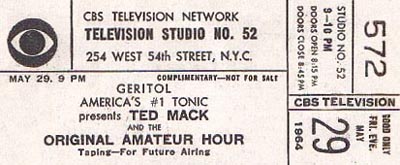Original Amateur Hour, The

It always struck me as a little odd that everyone on Ted Mack’s show had talent except Ted Mack. I also don’t recall ever seeing anyone on that show whose talents, real though they may have been, seemed likely to lift them to any other spot in the great pantheon of show business. A few of the folks who appeared on The Original Amateur Hour later had careers but not because of that show. I mean, Robert Klein appeared on Mr. Mack’s show as part of a doo-wop group called The Teen-Tones, but that didn’t lead to a single job. Moreover, the success rate, given how long the show was on the air and how many talented amateurs it showcased, was amazingly low. How did it stay on the air, between radio and TV, for almost 40 years? I’d guess that the early part of the run had appeal because America was still climbing out of The Great Depression, and there was a certain thrill to listening to some poor kid get a chance to play his ocarina on radio and maybe, just maybe, get discovered and strike it rich.
But I can tell you what kept the show on the air its last decade or so, and the magic word is right there on the above ticket: Geritol. Its makers had discovered that certain kinds of shows were very good for selling their product. Today, one hears a lot about demographics and advertisers who seek a young audience. Geritol did the opposite: They wanted to reach people who might purchase “America’s #1 tonic,” which meant mostly older folks. To that end, they sponsored a number of shows — Lawrence Welk’s being the prime example — even when the overall ratings weren’t grand. Today, a network might refuse the business (as ABC eventually cancelled Welk, despite Geritol’s wishes) on the grounds that a couple of older-skewing shows can drag down the rest of the schedule. But back then, individual sponsors had more clout, especially over certain time slots. So Ted Mack stayed on, despite a lack of talent or, at times, much of an audience.






